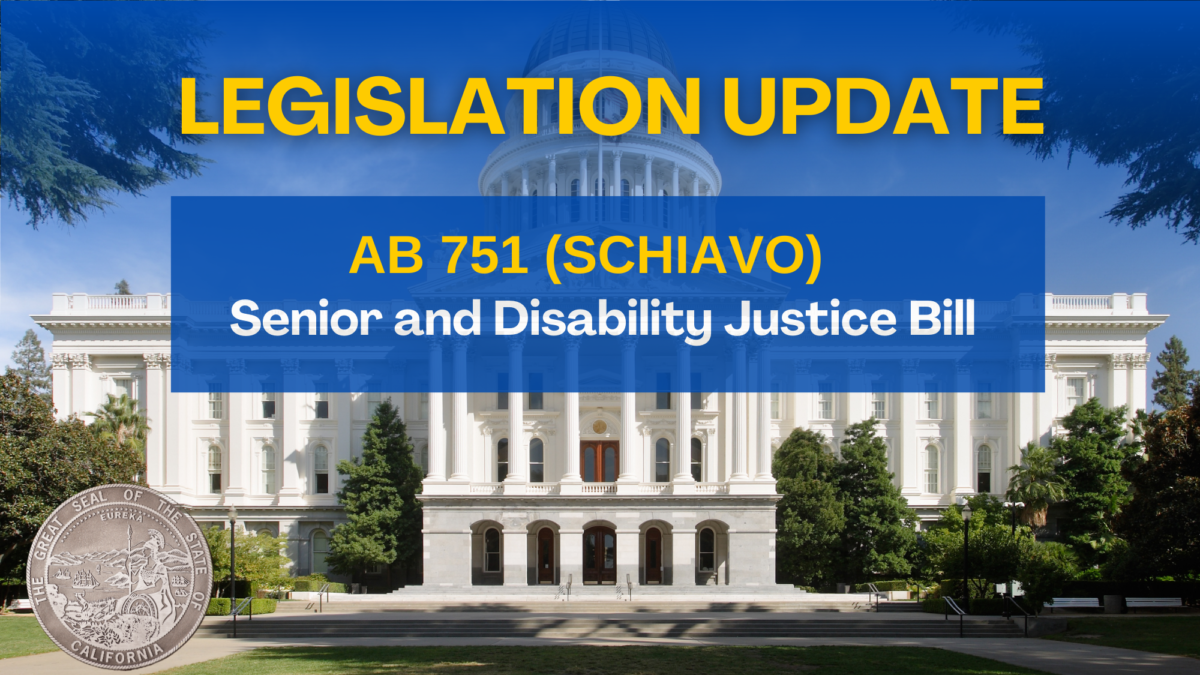In a major step toward revolutionizing policing to better protect people with disabilities and older adults, Governor Newsom last week signed Assembly Bill 751 to ensure that every city police and county sheriff’s department trains and guides its officers in this often-neglected aspect of law enforcement. The Arc & UCP California Collaboration and the California Alliance for Retired Americans sponsored AB 751. Assemblymember Pilar Schiavo carried the bill for us, and it becomes law January 1.
And in a related success, the Senate Public Safety Committee passed Assembly Bill 449 a similar bill covering all law enforcement agencies’ policing of hate crimes against all victims, with particular attention to anti-disability hate crimes. The bill moves now to an uncertain fate in the Senate Appropriations Committee, which must act on it by September 1. The Arc/UCP is the lead sponsor of AB 449, also backed by a wide, diverse coalition of community groups and carried by Assemblymember Phil Ting.
Why is there a need for action of this sort?
“Abuse of People with Disabilities: Victims and Their Families Speak Out” (Nora Baladerian, Thomas F. Coleman and Jim Stream, Spectrum Institute Disability and Abuse Project, 2013) surveyed victims with disabilities and their families. Of the cases where victims reported the abuse to authorities, 52.9 percent said that nothing happened. According to the victims and family members surveyed, the number of alleged perpetrators arrested was 7.8 percent.
This study added to the findings of an earlier university research project (“Crime Victims with Disabilities Specialists Program: A Report Prepared for the California Department of Mental Health,” Valerie Jenness, University of California Irvine, and Nancy Naples, University of Connecticut, November 2003), which summarized the problem starkly:
“Across a variety of studies, the officially reported violence against persons with disabilities is simply alarming. Moreover, the evidence suggests that officially reported violence against people with disabilities and criminal victimization of people with disabilities more generally is merely the tip of the iceberg as most violence against people with disabilities goes unreported. Lack of reporting occurs for a variety of reasons, including that the criminal justice system cannot–or will not–serve those with disabilities. Therefore, it is entirely appropriate to refer to people with disabilities who are victimized as ‘invisible victims.’ As such, they have historically and in the present day been systematically denied access to justice via the criminal justice system.”
AB 751, which the Legislature passed unanimously and the governor signed last week, ensures that almost every local law enforcement agency must adopt a formal Senior and Disability Victimization Policy guiding all officers. Among the many provisions of the policy are:
-
- Officers must investigate every report of a major crime against an adult or child with a disability or against an adult 65 or older, except in unusual compelling circumstances as determined by a supervising officer and reported to the victim and, upon request, to Disability Rights California. No more blowing off calls.
- If an officer has evidence of one of these major crimes, they must arrest the suspect when necessary to protect the victims or others and must seek emergency protective orders at the scene by phone to a judge on-call 24 hours a day.
- Every officer must be trained to handle these often-difficult cases.
- Every law enforcement agency must have an extensively trained senior and disability unit, or in smaller agencies at least one officer, to serve as a resource in these cases and act as the agency’s liaison to the senior and disability communities and other agencies.
- Every agency must develop a detailed checklist of first-responding officers’ responsibilities.
- Every agency must develop its own protocols for carrying out the policy, assuring the policy works for that department.
Last week’s actions came as the state Department of Justice released its 2022 hate crime statistics, showing a more than 20 percent jump over the 2021. As usual throughout the United States, though, the data almost totally left out anti-disability hate crimes, reporting just 12 statewide. Law enforcement agencies report less than 0.4 percent of the National Crime Victimization Survey’s estimated anti-disability hate crimes, according to the U.S. Bureau of Justice Statistics’ latest report.
AB 449, our hate crime bill, takes aim at this extreme under-reporting, both by encouraging victims with disabilities and all victims to report and guiding police to recognize hate crimes when they see them.


